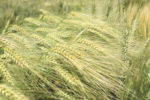Wheat
ARTICLES
UI Gold, a new HWS wheat cultivar suited for irrigated and dryland farms in southeast Idaho, will be available for planting this spring. It boasts good yields and superior end-use quality.
Read More
Field scouting Idaho ag: 2024 in review
Agronomists call 2024 an average year with highlights such as strong sugarbeet quality and a longer fall, but growers faced challenges from pests, rodents and extreme heat.
Read More
Inadequate zinc constricting Idaho wheat crops
Idaho wheat growers face zinc deficiency, losing 3.5 to 4 bushels per acre annually. Immediate zinc availability is crucial for improving seedling vigor and maximizing yields.
Read More
Are soil wetting agents worth the investment?
Wetting agents, like those used on golf courses, are being considered for water management in field crops. USU trials assess their effectiveness and suggest targeted use for hydrophobic soils.
Read More
The growing challenge of herbicide resistance in Idaho's beets and beyond
Herbicide resistance poses a growing challenge in Idaho agriculture, impacting crop yields and driving farmers to adopt diverse strategies beyond chemicals for effective weed control.
Read More
Profitability maps: A tool for informed farm management in Idaho
Yield mapping tracks field productivity based on georeferenced data, aiding in identifying spatial variability. Profitability mapping extends this by incorporating input costs and sales prices, enhancing decision-making for Idaho crops.
Read More
The glyphosate debate: Facts, risks and benefits
Contrasting perspectives on glyphosate’s use require a risk-benefit analysis. While some focus solely on risks, a closer examination reveals its scientifically supported benefits outweigh perceived risks.
Read More
University of Idaho barley agronomy program update – nitrogen fertility
This research focuses on sustainable barley and wheat production, emphasizing nutrient management for improved yield and quality. Research projects include evaluating nitrogen management strategies.
Read More










